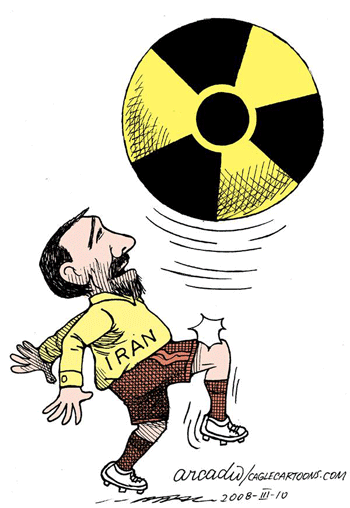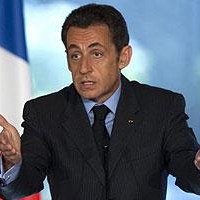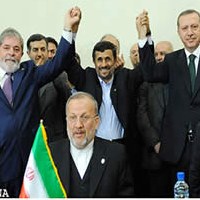![]()
Sun, Aug 08, 2010 | Intelligence and Terrorism Information Center

Increasing Concern Over Impact of Escalating Sanctions Against Iran
The European Union’s decision last week to approve a new package of severe sanctions against Iran’s commerce, finance, energy, and transportation sectors has been extensively covered on Iranian media this week. Commenting on the EU’s decision, most senior officials and media in Iran stressed that the new sanctions are not enough to cause damage to Iran’s economy, going as far as to discuss the sanctions’ inherent advantages.
This week, the Iranian president referred to the escalation of sanctions against Iran as a “political game”. Speaking at a weekly government meeting, Ahmadinejad said that Iran’s enemies are opposed to the development of the country, attempting to portray it as being weak in order to persuade the Iranian people to surrender. He stressed that Iran has no intention of backing down from its position, further adding that the Iranian people must turn the threats they are facing into opportunities (various news agencies, August 1).
Minister of Commerce Mehdi Ghazanfari has also addressed the escalation of sanctions against Iran, saying that they would have no impact whatsoever on Iran’s economy or its commercial activities. He noted that Iran currently exports its products to more than 160 countries worldwide, and that it is business as usual as far as Iran’s commerce and banking relations are concerned. Speaking about the possibility of an embargo on gasoline exports to Iran, the minister said that Iran has no problem of being self-sustaining in terms of its own energy needs, and that sanctions on gasoline exports would only turn Iran into an exporter of gasoline itself (ISNA, August 2).
The chairman of the Majles Industry and Mines Committee also played down the significance of the sanctions. In an interview to the conservative news agency Fars, Hossein Hashemi said that over the past thirty years the Iranian people have demonstrated their ability to successfully deal with economic sanctions. If managed correctly, he said, the sanctions may even boost domestic production and self-reliance. He specified the possible ways of dealing with the escalating sanctions, including: increasing reliance on domestic industry by imposing restrictions on import of products from countries cooperating with the West, strengthening the private sector, raising funds from local companies and expanding their involvement in local projects, and reducing government bureaucracy so as to make it easier for local companies to widen their economic activities (Fars, August 2).
In contrast, reformist Majles member Mohammad Mehdi Shahriari said this week that the sanctions have negative consequences for civilians and for Iran’s status. In an interview granted to a newspaper in North Khorasan Province, Shahriari said that the idea that the sanctions encourage local production is no longer relevant in view of the fact that the progress of countries now depends on international economic and cultural cooperation. According to Shahriari, the impact on the activity of international companies in Iran’s energy sector is leading to a significant increase in unemployment and a decrease in state revenues (Mardomak, August 2).
The two reformist opposition leaders Mir-Hossein Mousavi and Mehdi Karoubi have also expressed concerns this week over the escalating sanctions. During a meeting between the two, Mousavi stated that the sanctions are likely to have a severe impact on the Iranian people, mainly on laborers, farmers, and the weaker sectors of society, and to exacerbate the already severe economic problems currently plaguing the country (Jaras, August 2).
The Iranian press has provided extensive coverage of the escalation of sanctions against Iran. An editorial published by the conservative daily Tehran Emrooz discusses the positive consequences of the sanctions, claiming they make it possible to bring the hidden talents of the Iranian people to the forefront and make better use of the capabilities found in Iran. Thanks to the sanctions, Iran may achieve significant technological, industrial, economic, and even financial progress in the near future. According to the daily, the increase of industrial production capability, the scientific progress, and even the Tehran stock exchange gains are all signs of the beneficial effects of the sanctions. They have required Iran to cut down or even terminate its technological and economic dependence on Western countries, and may become an opportunity for growth for Iranian society, as well as economic and technological progress for the entire global Islamic front (Tehran Emrooz, August 2).
An article by top reformist economist and activist Sa’id Laylaz, published this week in the daily Sharq and cited on the website Asr-e Iran (August 2), also says that the sanctions are useless and that they will have no effect on Iran’s economy or its nuclear program. According to Laylaz, there are no historic precedents of a country collapsing or giving in due to severe sanctions, the best example of that being Cuba. He added that Iran has been facing tough sanctions for years. Nevertheless, it has extensive official and non-official trade relations with other countries, which it is able to maintain through its long sea and land borders, the majority of which cannot be monitored. Laylaz added that the escalating sanctions may lead to increases in the prices of imported goods, thus contributing to the increase of Iran’s local industrial production, similarly to the situation during the Iran-Iraq War. Laylaz further stated that the sanctions may have long-term effects; however, since the Iranian nuclear program is designed for the short term (or mid term at best), the use of sanctions to curb it is inappropriate and ineffective.
Meanwhile, the Committee for Lessening the Economic Effects of the Sanctions on Production and Commerce convened for the first time in the Esfahan Trade Chamber this week. Committee chairman Reza Khayamian said that the different aspects of the sanctions must be considered on the national and the provincial levels in order to reduce their negative impact on Iran. The committee discussed various ways that may alleviate the sanctions’ effects on the commercial sector, including: lowering interest rates, increasing government support of local companies, and providing benefits and tax advantages to exporters (Mehr, August 2).



 RSS
RSS














Increasing Concern Over Impact of Escalating Sanctions Against Iran #iran #nuclear #sanctions #eu http://j.mp/drLBSA
RT @CrethiPlethi: Increasing Concern Over Impact of Escalating Sanctions Against Iran #iran #nuclear #sanctions #eu http://j.mp/drLBSA